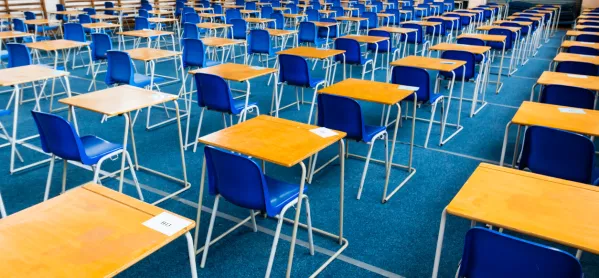- Home
- Year 10 and below will get GCSE grades, Ofqual confirms
Year 10 and below will get GCSE grades, Ofqual confirms

The exams regulator has confirmed that students in Year 10 and below will receive “calculated” GCSE grades this year.
It is Ofqual’s first published decision based on its consultation over the grading process, which closed on 29 April.
While the regulator initially said students in Year 10 and below would not need grades this year, in mid-April it said that having heard from schools about the effect on younger students’ progression if they did not receive a grade, it would consult on the issue, but felt this should be “permitted”.
Coronavirus: Year 10s could get GCSE grades after all
GCSE grades: No Ofqual checks for bias within schools
Exam cancellations: Teachers to rank order pupils for GCSEs
Today Ofqual confirmed that it had “decided that students entered for exams in Year 10 and below will be eligible to receive calculated grades this summer”.
Coronavirus: Arrangements for students taking GCSEs early
This was supported by the “majority” of over 12,600 responses received in the consultation, with many respondents arguing that younger students who could not receive a grade would otherwise be disadvantaged, as their schools would not continue to teach them the subject.
“Some argued specifically that disabled students and students with special educational needs who were planning to spread their GCSE entries over a number of years would be particularly disadvantaged if they were unable to receive a calculated grade this summer,” Ofqual said.
The regulator added that other respondents had raised concerns over the potential disadvantage to younger students sitting exams in community languages, who might sit earlier GCSEs.
Those against the proposals challenged the idea that schools with early entry patterns could not change their teaching for the next academic year.
Some said it was unfair to the majority of students in Years 9 and 10 for some students to receive calculated grades when most would sit exams in the future, and others “argued that the practice of early entry was generally detrimental to students’ learning”.
Ofqual also said that some respondents felt younger students should only receive a grade this year if they would be “significantly disadvantaged” by not receiving one.
However, the regulator said that “arrangements are complex” and were being put together “at speed”, and that there would be no merit in using resources to identify which younger students might be truly disadvantaged through not receiving a grade.
Private candidates will only get a grade through centres
Ofqual said that private candidates will only receive grades if the heads of centre they are registered with can be confident of giving them a teacher-assessed grade, and including them within the centre’s rank order.
This proposal had “broad support” among respondents, with the majority considering “this necessary for the fairness and integrity of the approach,” Ofqual said.
“Most of those who disagreed were students who are private candidates themselves and their parents or carers,” it added.
Alternative suggestions from respondents - such as the idea that those resitting an exam could be awarded a grade one grade higher than their existing one; to issue GCSE candidates with a grade 4 so they could progress on to A levels; or basing grades on the views of candidates’ private tutors and parents - were rejected by Ofqual, as these options would not produce “valid” grades.
The regulator said it agreed with some respondents’ suggestions that private candidates should be allowed to transfer to a new centre, and work with them to provide evidence of their likely grade if exams had gone ahead.
Last week, Ofqual published an update on the kinds of evidence private candidates could use with a new centre, including online meetings between students and subject tutors, or additional work completed under supervised conditions.
“So that the grading process is fair, the head of centre must have the same level of confidence in the grade and rank order position as for all other students when providing information to the exam board,” the regulator said.
Keep reading for just £1 per month
You've reached your limit of free articles this month. Subscribe for £1 per month for three months and get:
- Unlimited access to all Tes magazine content
- Exclusive subscriber-only stories
- Award-winning email newsletters



